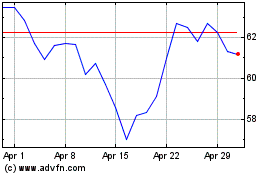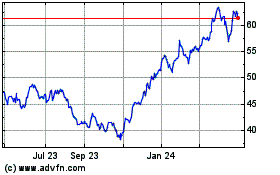Lufthansa Reports Narrower Operating Loss
May 03 2016 - 3:10AM
Dow Jones News
LONDON—Deutsche Lufthansa AG said it may further cut capacity
and restructure its air-cargo unit to offset lower prices even as
it posted a narrower first quarter-operating loss, a closely
watched measure of its performance.
Lufthansa is following the lead of British Airways-parent
International Consolidated Airlines Group SA among European
airlines that are curtailing growth plans and seeking new ways to
reduce costs to deliver on promises of improving earnings.
Germany's largest airline said on Tuesday its loss before
interest and taxes narrowed to €53 million euro ($61 million) in
the three months to end March compared with the same period last
year on a 0.8% decline in revenue to €6.9 billion.
The carrier swung to a €8 million first-quarter net loss from a
€425 million profit the same period last year when it benefited
from a €500 million one-time gain from the earlier-than-expected
sale of shares in JetBlue AirwaysCorp.
Lufthansa had made "a solid start" to the year, said Chief
Financial Officer Simone Menne.
Despite "significant pricing pressure," the airline said is
maintaining its full-year guidance for a slight improvement in
adjusted earnings beyond the €1.8 billion reported in 2015.
Weakness in some markets is forcing European airline's to dig
deeper to make earnings promises to investors despite the boon of
lower fuel costs as oil prices have fallen steeply.
IAG, which also owns Spain's Iberia, budget unit Vueling and
Irish carrier Aer Lingus, has reduced capacity because of weak
bookings, citing the impact of the terrorist attacks in Brussels
that killed at least 32 people when the city's airport and a subway
stop were hit by Islamic State suicide bombers. IAG also said it
was accelerating cost-cutting measures as it affirmed its full-year
target for higher earnings.
Lufthansa said fares were weak particularly to South America,
with bookings from Chinese and Japanese travel groups also down.
The airline said it didn't expect pricing pressure to ease, hence
the importance of controlling costs.
"The substantial unit cost reduction at our passenger airlines
has more than made up for the pricing declines," Ms. Menne said.
Lufthansa had reduced expenses beyond the windfall gains from lower
fuel costs. Excluding fuel benefits, costs were 4% lower than in
the year-prior.
"This marks an important change in trend in our unit cost
development," she said. Ms. Menne said the airline was sticking to
its goal of cutting nonfuel costs even as it benefits from a EUR4.8
billion reduction in fuel costs amid the slump in oil prices.
Lufthansa also said it has cut full-year capacity growth to 6%
from 6.6% because of the weakness in bookings and would consider
further retrenchment, she said.
Ms. Menne said the Brussels attack didn't have a meaningful
financial impact on the German airline, though passengers were
making bookings closer to their departure date.
Still, Lufthansa, which had been considering buying the 55%
stake in Brussels Airlines parent it doesn't already own, last week
said the decision had been delayed until the summer.
In the first quarter, the carrier benefited from an improved
operating performance from its main Lufthansa airline and Austian
Airlines, partly offset by a decline in earnings at Swiss Air Lines
and Eurowings, its budget carrier.
Lufthansa's cargo business remained under pressure from weak
prices, with first-quarter revenue down 22%, partly the result of
"sizable overcapacity particularly on trans-Atlantic routes and low
demand," the airline said.
Ms. Menne said the unit may have to be reorganized to offset the
trend, without providing details.
Write to Robert Wall at robert.wall@wsj.com
(END) Dow Jones Newswires
May 03, 2016 02:55 ET (06:55 GMT)
Copyright (c) 2016 Dow Jones & Company, Inc.
Citigroup (NYSE:C)
Historical Stock Chart
From Mar 2024 to Apr 2024

Citigroup (NYSE:C)
Historical Stock Chart
From Apr 2023 to Apr 2024
